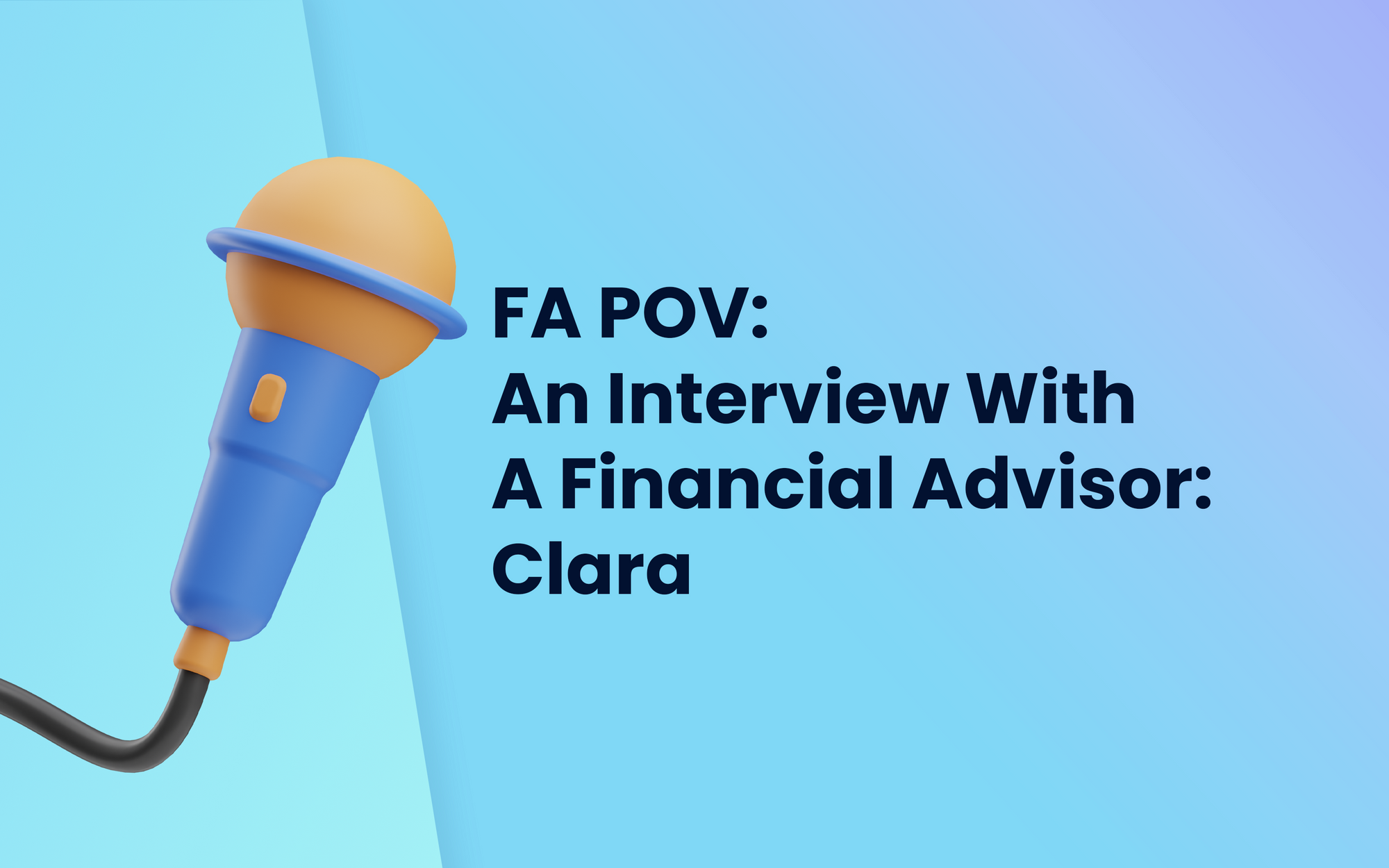An Interview with our Financial Advisor - Clara Lum
Managing your personal finances and making smart investments can be tricky paths to navigate. Hear what a financial advisor has to say about it!


In continuation of our FA interview series, this week the Pint’s team sat down with Clara Lum, an inspiring young financial advisor who came into the industry at the age of 21. From reading books on investing, to prioritizing one’s personal development, here are some key tips Clara has for anyone looking to achieve their financial goals.
How Has Being an FA Helped You in Your Financial Journey?
“I think that as the role of FAs is to help others plan out their finances, it’s fairly important to be a role model yourself in terms of managing your own finances. For instance, displaying good spending habits so that you won’t fall back on your own financial goals, etc. So being in this line has definitely made me more aware of that.
I also learned more about how to invest and apply different financial concepts I was previously unfamiliar with when I became a financial advisor. Things like compound interest and how they apply to different scenarios were previously unfamiliar to me. That concept in particular also made me realise the importance of investments. For example, if you want to get a million dollars by a certain age, would you rather save up to reach that amount or invest it, allowing compounding interest to let the money work for you?”
What’s The Best Piece of Financial Advice You’ve Ever Received?
“My mentor once told me that in order to earn money, I had to learn how to spend money.
As a typical Asian, this seemed very counterintuitive, as I used to be very conservative in my spending. I would typically just save a lot, and I didn’t know much about investments. Once I tried it, though, I saw what he meant. When I increased my expenses, I did see my income gradually increasing as well. For instance, setting a set amount to put into investments every month and treating it as a “non-negotiable” made me more conscious of managing my finances and finding ways to earn enough to meet this new financial obligation.”
If You Could Personally Give Someone A Piece Of Financial Advice, What Would It Be?
“Don’t spend more than what you earn. You never want to be in a deficit; it’s very scary to be in one. If you’re spending beyond your means, you’ll find yourself having to deal with the stress of getting loans and paying even more because of interest, etc. Especially when you own a credit card and go beyond your limits, it’s even worse because the interest on those cards is even higher. If you want to improve your spending capacity, I would say it’s better to just set aside funds every month to invest.”
Has There Been Any Incidents That Have Shaped Your Outlook on Personal Finance?
“Yes, for sure. I learned about the importance of getting insurance after my mom had to be admitted to the hospital several times. As she needed to get day surgery, I saw that had she not been under a hospital plan, we would have had to pay a crazy amount of money, which was something that the family did not have. Because of that whole situation, I was very grateful that my mom had decided to get the plan before this had happened.”
How Would You Advice Those Who Are Looking To Get Into Investing But Are Waiting For The “Right” Moment?
“There’s no right moment, and beginner investors should understand that the market works in a cycle. It goes up and it goes down, but it will always go back up, to a level that’s higher than in the past. So instead of waiting for the right moment to invest, it’s better to invest now, and dollar-cost-average your way into an overall favorable return.”
For those who are unfamiliar with the concept, dollar-cost averaging was coined by Benjamin Graham in his book The Intelligent Investor, and it involves investing the same amount of money in a target security at regular intervals over a set period of time, regardless of the price.
“I would also recommend only buying stocks if you know how the company works. Don’t invest in a stock if you don’t know what the company’s main source of revenue is or how their operations are. Rather, make sure you have a good knowledge of their fundamentals before putting money in. Otherwise, you’re probably just going to let it sit there and watch it degenerate.
Lastly, get yourself an investment buddy—someone whom you can count on to hold you accountable for your investment choices and also trade information with. My own buddy and I are constantly sending articles and information to each other, just to keep each other in the loop about things. They can also help chill you out in times when the market is down and advise you not to panic-sell haha.”
What Are Some Good Ways for Anyone to Improve Their Financial Literacy?
“You could go to the library and read up on the books they have on investing there. It’s a low-cost way of getting started, and it’s what I used to do. It doesn’t even have to be a super thick book, but just make sure it's a topic you’re not already familiar with. Even if you don’t have a personal FA, this can help you plan for your future and manage your finances.”
Is There Any Book You’d Recommend In Particular?
“The Coffeehouse Investor" by Bill Schultheis is a really good one for beginner investors.”
Apart From Financial Investments, What Other Areas In Life Are Worth Investing In And Why?
“Definitely invest in yourself, your image, or anything that helps you feel better about yourself. Personal development and learning more about yourself are all good investments. After I became an FA, work eventually fell into somewhat of a routine for me, like a 9-to-5 job. So even though I still enjoyed talking to my clients, the realisation that I wasn’t learning anything new hit. What I did was go to the library a lot more often to read up on things that interested me.”
We hope you enjoyed learning about Clara’s perspectives and advice as much as we did! For more money-management tips, check out the interview we did last week with David Wang, a student and financial advisor.